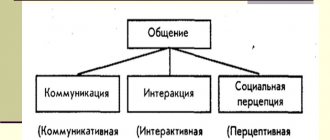Effective communication skills are one of the most important and necessary skills to cope with any life situation. Your likelihood of achieving success at work and in the community, earning the respect of your friends and family, children, spouse, boss or co-workers all depends on how effectively you communicate.
Half of what people usually try to communicate to others is lost in the process of translation and interpretation. What you are trying to say may not always be understood correctly by the listener, and this can lead to misunderstandings.
Although many people admit to being ineffective at communicating, each of us can develop effective communication skills over time through practice. Such communication is usually more spontaneous rather than staged or pre-rehearsed, since in this case the speech appears more emotional and convincing.
“Words are the most powerful force available to humanity. We can use this power constructively, using words of encouragement, or destructively, using words of despair. Words have energy and power that can help, hinder, hurt, harm, offend and humiliate.”
-Winston Churchill
Express your attitude
Sometimes being effective in an important conversation is hindered by a person’s inability to conduct it correctly. Communicating is not only exchanging words and general phrases, but also expressing your attitude to the subject or topic of conversation. If a person does this, then he gives the impression of awareness and understanding of the topic of conversation.
Expressing an attitude means being able to correctly and competently tell your opponent what you personally think about this matter, instead of using vague characteristics of other people’s opinions. It also means talking about your own experiences. The expression of the attitude must be supported by conclusions that are understandable and logical.
Criteria
To achieve effective communication, its elements must meet the following criteria:
- The sender must choose the optimal channel for transmitting information - verbally or in writing, correctly determine the intonation with which the message will be transmitted, or turn to non-verbal methods.
- Information must be clearly, completely and understandably presented to the recipient.
- The recipient must confirm that he accepted and understood the information transmitted to him.
Only if these three criteria are met can communication be considered successful.
Examples
- Effective communication in conflict. Returning from the army to his parents' house, the son spent the day surrounded by relatives, after which in the evening he got ready to visit close friends. Looking around at the mirror, he heard his father’s demanding voice: “You must be home at 10 pm.” Without stopping what he was doing, the son calmly said: “Forget it, dad. This is already in the past." Conciseness, confidence and calmness in this case were the best way out of a brewing conflict situation, since these are the qualities that are inherent in a mature, independent man.
- Effective communication with children. A very indicative scene from the movie “Gentlemen of Fortune”, when the teacher addresses children who do not want to have breakfast: “Children, breakfast is canceled for today, because we are flying on a rocket to Mars, so take the space spoons in your hands and have a good meal, because We’ll only be back on Earth around lunchtime.”
Adjusting to the children's wishes and subsequent rejection of persuasion, which children are prejudiced against, allowed them to switch their attention and look at the situation from a different perspective.
A culture of speech
Speech culture has a significant impact If a person has a sufficient vocabulary, it will be easier for him to express his thoughts to his interlocutor.
However, speech is not only a way of expressing thoughts, but also a means of understanding the world. An educated person will better understand his interlocutor, which will make communication more successful.
Cultural speech that meets the requirements of etiquette also helps to establish friendly contact with others - addresses consistent with the rules of etiquette facilitate further deepening of contact with the interlocutor.
Rules for successful communication
The famous speaker Dale Carnegie published the book “How to Win Friends and Influence People” more than 80 years ago. In it, he described the most effective basic communication techniques and rules that will help introverted and shy people become excellent conversationalists. These rules remain relevant to this day.
- Genuinely showing interest in other people. Often we find it more pleasant to talk with those who are interested in our personality and ask various questions regarding our opinion and experience. Therefore, be sure to ask questions to your interlocutor. But don't turn the conversation into an interrogation with bias. Everything should be natural and sincere, and for this you must experience genuine interest in your interlocutor.
- Smile. A person who smiles evokes positive feelings in us. Even if we don’t know him personally. During a conversation, your smile is proof that the interlocutor is pleasant to you and you like talking to him. Just try to avoid a fake smile. Smile not only with your mouth, but also with your eyes, soul, and heart.
- Proper name. From birth, the sound of our name is the most pleasant sound. Therefore, always address others by their first and middle names if necessary. The name indicates the individuality of a person, his originality and uniqueness. This is the simplest compliment you can give someone. Just call him by name.
- Listening skills. In conversation, people usually prefer to talk more than listen. Often they simply wait for their turn to speak and do not try to listen and understand what they are told. Especially during an argument. If you listen carefully to your interlocutor, ask him clarifying questions and successfully use phrases that he said earlier during the conversation, then you will pleasantly surprise him. Listening and hearing your interlocutor is much more important than speaking.
- Interesting topics for conversation. Talk about topics that are interesting to your interlocutor, and finding out about them is quite easy and simple, using rule No. 1 - showing sincere interest. When a person talks about something exciting, his eyes light up. Even if this topic does not seem particularly interesting to you, still try to listen. Surely you can learn something valuable and interesting for yourself.
- Compliments. Each of us has unique characteristics that are worthy of admiration. Try to notice them in your interlocutor and sincerely express your admiration, approval, and praise. Your compliments should not be exaggerated and resemble undisguised flattery. Falseness always feels good. A timely, sincere compliment will be very pleasant to your interlocutor and will make the conversation even easier and more relaxed.
Books
Effective communication is too broad a topic to cover in one article. You can read more about its conditions and techniques in the following books:
- “Fundamentals of the theory of communication” O. L. Gnatyuk.
- “How to talk so that children will listen, and how to listen so that children will talk” by Adele Faber, Elaine Mazlish.
- “I want to speak beautifully! Speech techniques" Natalya Rom.
- “Effective communication. Techniques and skills" Ulla Dick.
- “The Language of Communication” by Marian Bugajski.
- “Theory and practice of intercultural communication” E. N. Belaya.
We wish you good luck!
Did you like the article? Join our communities on social networks or our Telegram channel and don’t miss the release of new useful materials: TelegramVKontakteFacebook
We also recommend reading:
- Storytelling
- 6 Effective Communication Techniques
- How to become an active listener
- How to improve your listening skills
- Six Key Principles of Effective Communication
- The Cycle of Effective Communication
- Checklist for effective communication
- 3 Eco-Friendly Ways to Get What You Need from Someone
- 10 Ways to Improve Your Communication Skills
- Communication in business
- Development of communication skills
Key words:1Communication
Criticism is not the end of the world
Many people in the first stages of mastering the skill of effective communication are afraid of criticism from others. This doesn't make any sense. Competent, objective criticism can help you see mistakes and weaknesses that you yourself would never have noticed. Hateful criticism, said only to hurt you, is not worth your attention. Do not react to such statements under any circumstances, and do not rush to prove something to such an interlocutor. Your peace of mind will look much more dignified. When choosing how to respond to the words or actions of others, pay attention to those that suggest calm and a positive message.
Definition of basic concepts
Effective communication - what is it in psychology?
Currently, the importance of communication in a person’s life is constantly increasing, and therefore requires additional study of the technology of effective communication, as well as mastering skills that contribute to this.
The effectiveness of communication in psychology means the optimal way to achieve the goal of communication , in which the loss or distortion of the true meaning of the meanings, attitudes, and reactions transmitted to a person and received from him is minimized.
Verbal skills are not the only challenge of effective communication
Words and well-delivered speech are very good. But, unfortunately, this is only half the success. To fully solve the formula for effective communication, you will also have to master the secrets of sign language. What do we mean? Let's say imagine the situation. You return from vacation, and a colleague tells you:
- How glad I am that you are back?
But at these words, the colleague purses his lips, he sits with his arms crossed over his chest. He's hardly speaking sincerely, is he?
Conditions
Speech communication will be successful if the following conditions are met:
- The content of the speech should correspond as much as possible to the purpose of communication , not contain elements that are not related to the topic under discussion, and be concise and adequate.
- The speech must be grammatically correct and accurately reflect the message that needs to be conveyed to the interlocutor.
- The presentation of thoughts should be logical and consistent . A well-structured narrative structure contributes to its successful perception by the listener.
The role of barriers in effective communication and how to overcome them
Communication barriers prevent our messages from reaching the other person's mind or distort them so that they lose their original meaning and message. There are many barriers that can impede effective communication, including physical (distance, noise, etc.), physiological (hearing or speech impairment), sociocultural (cultural differences), semantic (signs and symbols) or, in fact, linguistic.
Other factors that can act as barriers include environment, stress, context, interference, emotional imbalance, lack of interest or focus, inconsistent body language, etc.
Obstacles to effective communication can be overcome through the right means—using shorter sentences, better organizing your message before sending it, training, being empathetic and mindful, avoiding prejudice, information noise, etc.
Factors
What are the factors that contribute to effective communication? the successful outcome of communication :
- A favorable environment in which the conversation takes place . For example, if a situation that implies intimacy, confidentiality of communication, makes it possible for those communicating not to be heard by others, this will contribute to a confidential conversation.
- Compatible psychological characteristics of the participants in the conversation .
This includes the gender, age, character and temperament of the participants. As a rule, communication is more successful among people of close age; also, certain types of people by character and temperament interact better with each other. - Same social status. Interaction will be more successful with people belonging to the same social class.
- A trusting atmosphere in the team, its cohesion. For example, with established benevolent norms of behavior in a team, professional interaction will be an order of magnitude more effective than in a team in which everyone is accustomed to protecting only their own interests.
- Common goals and motives among interacting people. If the situation involves achieving a common goal, as a rule, mutual understanding is established between partners much faster, leading to successful communication.
What are the factors that reduce the effectiveness of communication? These factors significantly reduce the positive outcome of communication :
- The situation is inappropriate to the topic being discussed. For example, when trying to discuss a confidential conversation in a public place, the recipient—the person to whom the message is addressed—will avoid the discussion.
- Different social status. Communication barriers often arise between people belonging to different social classes.
It is determined by internal prerequisites about one’s belonging to another class, a feeling of one’s superiority or, conversely, inferiority. - Disunity in the team. The effectiveness of business communication will significantly decrease if, according to established norms in a team, everyone must protect their own interests - even with the awareness that this will negatively affect the solution of professional problems.
- Various goals. With the initial desire to achieve different goals, especially if it is impossible to achieve a compromise that satisfies all parties, the effectiveness of communication decreases.
Psychology of dealing with arrogant people
In life we meet different people, and we must be ready for any communication. Often on our path in life we encounter insolent people - these are people who behave shamelessly and arrogantly in order to achieve their own goals and benefits. They don't take anyone's opinion into account, don't care about other people's feelings, and believe that they are always right.
You can behave differently with arrogant people. For example, respond to rudeness with rudeness, ignore, manipulate, put in place. It all depends on the situation and who is in front of you. Being rude to your boss will be fraught with danger, for example.
- The first thing you need to do is not be afraid to say no. You need to be tough and not fall for any persuasion or manipulation. If you don't understand the refusal, start ignoring it.
- Try not to stoop to the level of insolence, no matter how much you want to be rude. This way you will be involved in his dirty game and are unlikely to be able to verbally defeat a born boor.
- The main goal of an insolent person is to throw you off balance and force you to do what he wants. So try to remain patient and calm. Drive him crazy with your calmness and let him go looking for another victim.
- Never allow anyone to violate your personal boundaries and mind their own business. You have every right to protect your personal space.
You must understand that all methods of effective communication are based on understanding yourself and your interlocutor. You must learn to understand people, understand who you are dealing with. In any case, respect, acceptance and awareness of the value of each person are the basis of successful communication.
Basics
Effective communication is based on knowledge of human psychology and perception . An interlocutor who has mastered the skills of effective communication will be in a more advantageous position; it will be easier for him to achieve his goal in communication than an interlocutor who is unfamiliar with these concepts.
Ideally, communication is productive , it is beneficial for both partners and leads to their interaction, strengthening contacts and mutual trust. However, it should not contradict the basic principles of effective communication.
The language of modern man
must use the full range of communication capabilities to achieve effective communication .
It includes not only good command of speech, but also knowledge about methods of non-verbal communication - gestures, postures, facial expressions, sometimes unconsciously expressing the emotions of the interlocutor.
Knowledge of these nuances allows you to better understand your interlocutor , and, therefore, develop the best communication strategy to achieve a particular goal. Moreover, these skills must be constantly developed.
Effective communication training will help you master communication methods and techniques, which can significantly increase a person’s opportunities for self-realization, achieve success in the professional field, and also improve interpersonal relationships.
Basic principles of building communication
You need to work on relationships, no matter who you are - a customer or a contractor.
This is more relevant today than ever. This is because the market has reached a point of development where it is difficult to compete only at the level of a product or service; relationships decide a lot. Both with clients and partners.
One of the priority tasks of the business and the competence of each of the employees at the same time is the ability to build effective relationships in all directions: horizontally and vertically; external and internal; with suppliers, contractors and clients.
If we summarize the skills and put them into one ideal idea of communication, then this is what we strive for:
— both sides look in the same direction and work for the same result;
— partners keep the same goals in focus;
- are able to negotiate areas of responsibility;
- complement each other's efforts.
How to improve your skills
Completing specialized training will help you develop your communication skills, where practicing models of life situations, even in the event of an error, will not entail irreparable consequences, as happens in life. Professional mentors will help you learn how to resolve conflicts, develop persuasive speech, acquire effective self-presentation skills, and increase the credibility of your words.
In a group of like-minded people, there is an opportunity to creatively approach solving communication problems, test different ways of influencing the interlocutor, use different roles and play out necessary situations. The training course provides a range of techniques and exercises that can be applied in specific situations.
Once you get the first results from the methods in real life, move on to more complex and sophisticated communication options. To achieve greater efficiency, you can practice your communication skills in the company of friends and family.











